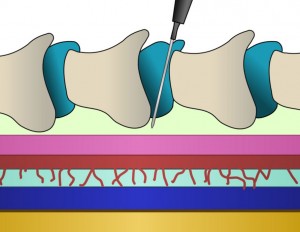An epidural injection increases the risk of high fever of the mother during delivery and may endanger the newborn

One of the hardest decisions What a pregnant woman needs to know is how to deal with the pain of childbirth. More than 60% of births in the US choose epidural analgesia: a combination of local anesthesia and an anesthetic injected into the epidural space around the spinal cord. Although most doctors agree that this injection is safe, new research shows that it may increase the chance that the mother's body temperature will rise during childbirth. And in rare cases the heat may endanger the baby.
Epidural anesthesia has long been controversial. There are studies showing that women who request an injection end up with an emergency caesarean section at a higher rate, but a review done in 2011 states that an epidural injection does not increase the need for a caesarean section more than pain relief in another way. But in the same study it was also found that in births with epidural anesthesia, the chances of the doctors having to deliver the baby with the help of forceps or vacuum suction increases.
Now the midwives have to take new findings into account. In a study published in the February 2012 issue of Pediatrics, researchers from the School of Public Health and Harvard Medical School followed 3,209 women in low-risk first pregnancies. Among the mothers who received an epidural injection, almost one in five developed a fever higher than 38 degrees during delivery, compared to about 2.4 out of a hundred among mothers who received other treatment or did not receive painkillers at all. The higher the mother's body temperature, the smaller the child's chances of achieving a high Afger score. Apgar score is a measure of the general health of the newborn. These babies are also likely to have low muscle tone and difficulty breathing. Moreover, among 8.6% of the women who received epidural anesthesia and developed a fever higher than 38.3 degrees, the risk of neonatal convulsions was six times higher than the risk in the mothers who did not suffer from high fever, even though the overall risk of neonatal convulsions is only 1.3%. It is not yet known why there is this relationship between epidurals and high fever, but one of the senior researchers on the team, Alice Lieberman, a biologist and midwife from the Harvard School of Public Health, believes that the numbing drug may be triggering an inflammatory response.
The big question that remains is whether this high temperature could affect the child's long-term health. "We don't know for sure," Lieberman says, but the effects "are probably transient." Still, since the fever lasts about six hours on average from the moment of the injection, women who want to minimize the risk can consider whether to ask for the pain reliever only when the moment of delivery is really approaching.

